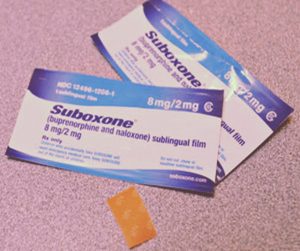Navigation:
[vc_row][vc_column][vc_cta h2="Help Is Only A Phone Call Away" txt_align="center" shape="round" style="flat" color="vista-blue" el_width="sm" use_custom_fonts_h2="true" use_custom_fonts_h4="true"]Call Now 855-227-9535[/vc_cta] Suboxone isn’t the most popular drug around, and so many people are unfamiliar with it. Somehow, this unfamiliarity makes suboxone quite dangerous, because people simply don’t know enough about it to be wary of its effects. We’re talking about potential misuse of suboxone, which could lead to addiction or dependence. Here we are going to talk about some of the things you need to know about suboxone. What exactly is it? How does it work? Is it a narcotic? Can suboxone abuse cause physical dependence and suboxone overdose? How does opioid treatment work? Does it affect a person's mental health the same way an opiate addict is affected? Is suboxone addictive? Let’s take a closer look.Suboxone: An Overview
 Suboxone is one of the most commonly used prescription medicines for opioid withdrawal. That’s what makes it so uncommon. Only those who’ve been into drug rehab have probably encountered it. It is intended to be used under medical supervision, and only as part of an addiction treatment program. Suboxone is one of the best medications for heroin addiction treatment. It is also used for prescription drug abusers. This drug is actually a combination of buprenorphine and naloxone. Buprenorphine is an opioid agonist, meaning it activates the same receptors as other opioids, albeit in a less significant way. You wouldn’t get high on this substance. Naloxone on the other hand is an opioid antagonist, meaning it blocks the effects of opioids. Taking suboxone can therefore trigger precipitated withdrawal, welcoming the sudden onset of withdrawal symptoms. That’s why suboxone must be taken under medical supervision.
Suboxone is one of the most commonly used prescription medicines for opioid withdrawal. That’s what makes it so uncommon. Only those who’ve been into drug rehab have probably encountered it. It is intended to be used under medical supervision, and only as part of an addiction treatment program. Suboxone is one of the best medications for heroin addiction treatment. It is also used for prescription drug abusers. This drug is actually a combination of buprenorphine and naloxone. Buprenorphine is an opioid agonist, meaning it activates the same receptors as other opioids, albeit in a less significant way. You wouldn’t get high on this substance. Naloxone on the other hand is an opioid antagonist, meaning it blocks the effects of opioids. Taking suboxone can therefore trigger precipitated withdrawal, welcoming the sudden onset of withdrawal symptoms. That’s why suboxone must be taken under medical supervision.
Is It a Narcotic?
Buprenorphine can technically be considered a narcotic because all opioids and opiates are narcotics. Naloxone is not a narcotic. So suboxone has one active ingredient that’s an opioid antagonist, while the other is only partially a narcotic. Suboxone is not fully a narcotic. Its status as a combination drug makes it difficult to classify. In law enforcement, the word “narcotic” is used in a much broader fashion. It is defined as any drug that dulls the senses, regardless of what kind of drug it is. It doesn’t have to be an opiate or an opioid to be a narcotic, in this regard. But suboxone is used for addiction treatment, and doesn’t necessarily have that effect, so it is still not classified as a narcotic. Legally speaking, the word narcotic is almost synonymous to “illegal drugs”. Suboxone is not illegal, and is available via prescription.Suboxone and Substance Abuse
Suboxone may have its benefits, but it’s not without its risks. That is why it should be used in conjunction with a rehab program. This substance also has its limitations. It primarily helps combat withdrawal symptoms as well as cravings, but it does not address addiction and dependence. Suboxone medication can also lead to physical dependence—the very thing it’s trying to help you with in the first place. People sometimes misuse this drug. However, the risk for addiction and dependence are quite low. The risk increases when the drug is used in combination with other substances, particularly alcohol and depressants. It is also possible to overdose on Suboxone. While it is a powerful tool when used correctly, and while its benefits are undeniable, the risks should also be acknowledged. Be sure to work closely with your doctor when using this drug. You don’t want to replace one addiction with another. But if this does happen, you need to know about drug addiction treatment. It also helps to know if your insurance coverage can provide assistance for your addiction recovery. If you know someone who is addicted to suboxone, look for an addiction treatment facility near you. Though the risks are low, it is possible to become dependent on this drug, so it should be treated with care, just like any other kind of addiction. Visit a nearby treatment center and find out how to deal with this type of opioid addiction. [maxbutton id="2" ] These intervention programs may involve a standard drug test to help assess the severity of its common side effects. Because of the way suboxone buprenorphine and naloxone affects certain receptors in the brain, expect drug withdrawal and other effects of suboxone. Substance abuse treatment, specifically suboxone treatment may involve medical detox and therapy tackling behavioral health. But there are other treatment options available, so it may depend on the drug abusers mental health and condition. Look for the signs and symptoms of prescription medications abuse. Treatment centers are ready to help you and your loved one with all your health care needs. You just need to take the initiative.
Is Suboxone a Narcotic? was originally published to www.rehabnear.me
from
https://www.rehabnear.me/suboxone-a-kind-of-narcotic/

No comments:
Post a Comment